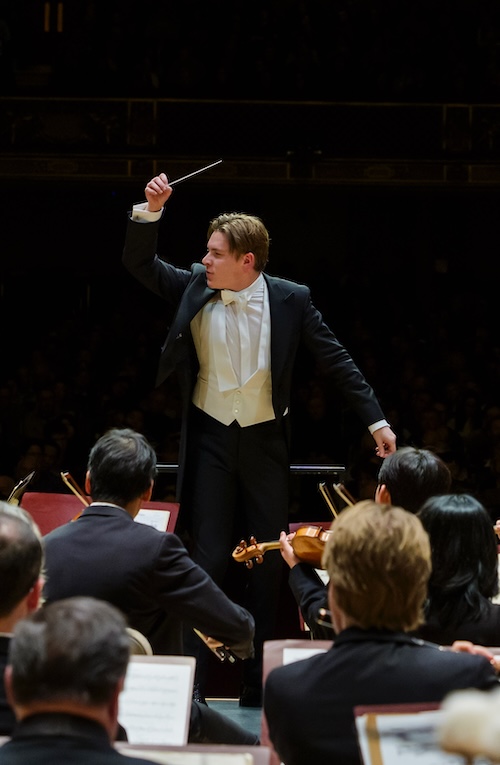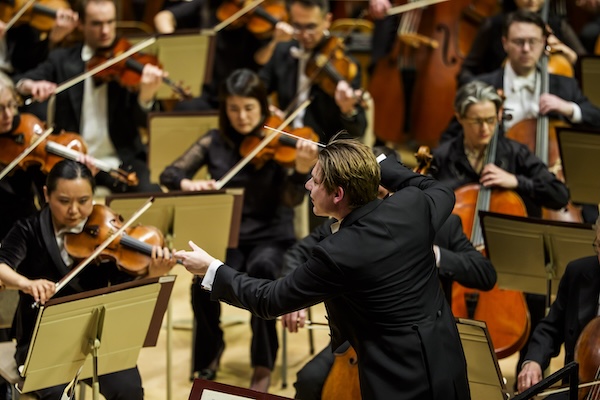Performances
Sarasa Ensemble explores 17th-century Bologna composers with intimate flair
The Sarasa Ensemble curated a program titled “alla Bolognese” Saturday night […]
Danish String Quartet artfully contrasts violent Schnittke, heart-easing Ravel
“I do not ask for my music to be interpreted,” Maurice […]
Adès returns to lead Boston Symphony in a vibrant season highlight
Talk about a strong finish: while the Boston Symphony Orchestra’s spring […]
Articles
Top Ten Performances of 2025
1. Erich Wolfgang Korngold: Die tote Stadt. Andris Nelsons/Boston Symphony Orchestra […]
Concert review
Chicago Symphony makes a triumphant Boston return after 24-year absence

Klaus Mäkelä conducted the Chicago Symphony Orchestra Sunday in Symphony Hall. Photo: Todd Rosenberg
Shakespeare, for once, had it backwards: better three hours too soon, his Master Ford tells us, than one minute too late.
For their first appearance in Boston since October 2001, the adage might be more fittingly styled “better twenty-four years too late than twenty-five.”
So it happened that the CSO made a triumphant return to Symphony Hall on Sunday afternoon, courtesy of Vivo Performing Arts. Music director designate Klaus Mäkelä was on hand to lead music by Beethoven and Berlioz. And while that lineup was firmly canonic, there was nothing workaday about either the 30-year-old maestro’s interpretations or the ensemble’s performances.
Mäkelä made his Boston debut with the Orchestre de Paris two years ago, yet the young conductor remains something of a stranger to these parts. His discography shows glimpses of excellence, though it’s not entirely consistent. In person, however, he has a reputation for electricity—and that was demonstrated on Sunday.
His approach to Beethoven’s Symphony No. 7, for instance, was shapely, beautifully balanced, and well thought out. Across the reading, the CSO’s tonal blend was unfailingly natural and pristinely weighted, whether during soft, lyrical moments or in exuberant, martial passages.
Woodwind solos in the first-movement introduction were serene and flowing, Mäkelä drawing a surprising mix of nobility and forceful rhetoric from this familiar music. Later in that section and during the finale, the low-string ostinatos projected with elemental force, their pendulum-like weightiness calibrated to enhance the snapping, dancing drama unfolding above them.
If some tempos felt a touch broad—the second movement seemed more like an Andante than an Allegretto—the CSO’s playing was rhythmically taut and ever alive to the music’s gradations of dynamics. Moments of terrific inwardness characterized the latter and Mäkelä carved out an enchanting bit of cinematic musical space in both of the Scherzo’s trios.
At various points in the symphony, the conductor proved himself an adherent of the Petrenko–Fischer school and modeled the maxim that “less is more.” Shaping the sound with his left arm and not excessively beating time with his right, he simply let his orchestra play. They responded in kind: the closing Allegro con brio leaned almost equally into dance and song, unified by bracing displays of contrapuntal discourse.
Taken together, then, this was an exhilarating Beethoven performance in which every part understood and executed its role with uncommon purpose. Rarely does the composer’s mere handling of the orchestra provide such a rush (usually that experience is the result of the music itself). Then again, rarely is the Seventh Symphony dispatched with the virtuosity and care that Mäkelä and the CSO lavished on it on Sunday.
For dazzling instrumentations, one is more apt to turn to Berlioz and his ubiquitous Symphonie fantastique. First performed in 1830 (just thirteen years after the premiere of Beethoven’s Seventh), this is music, on the one hand, of youthful ardor and impetuousness. At the same time, it exhibits a rich poeticism and a deep awareness of Classical style.
On Sunday, Mäkelä’s account straddled both lanes, the first four movements coming over particularly well. In “Reveries – Passions,” the development’s queasy hairpin swells were teased out with aplomb and the section’s rip-roaring zenith infused with abandon. Its introduction and coda, too, were shapely and warm—especially the latter, which truly sounded like a prayer.
Scene painting of the best type carried through the waltz, whose mid-movement reveal of the “idée fixe” theme was captivatingly three-dimensional, the orchestra’s staggered dynamics etching a picture of ominous urgency. The “Scene in the Country,” too, was marked by marvelously blended ensemble work and exquisite woodwind solos. Though Mäkelä opted to take the narrative-killing repeat in the “March to the Scaffold’s” exhibition, the CSO’s rich tonal palette and play of character more than held the ear.
Only in the finale did some interpretive quirks emerge in the form of fussy tempo and phrasing manipulations during the “Witches’ Round Dance.” But such was the focus and brio of the orchestra’s playing that these hiccups hardly detracted from the big picture. Indeed, Thursday’s packed house didn’t seem to care, showering Mäkelä and the CSO with a thunderous ovation and multiple curtain calls.
Vivo Performing Arts presents the Vienna Philharmonic Orchestra playing music by Bartók and Mahler 7:30 p.m. Tuesday at Symphony Hall. vivoperformingarts.org
Posted in Performances
No Comments
Calendar
March 5
Music Worcester
Nelson Goerner, pianist
Chopin: Fantasy
Schumann: […]
News
Boston Classical Review wants you!
Boston Classical Review is looking for concert reviewers based in […]





